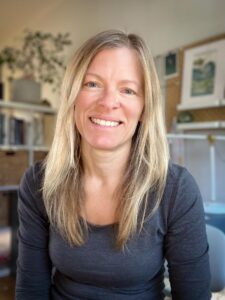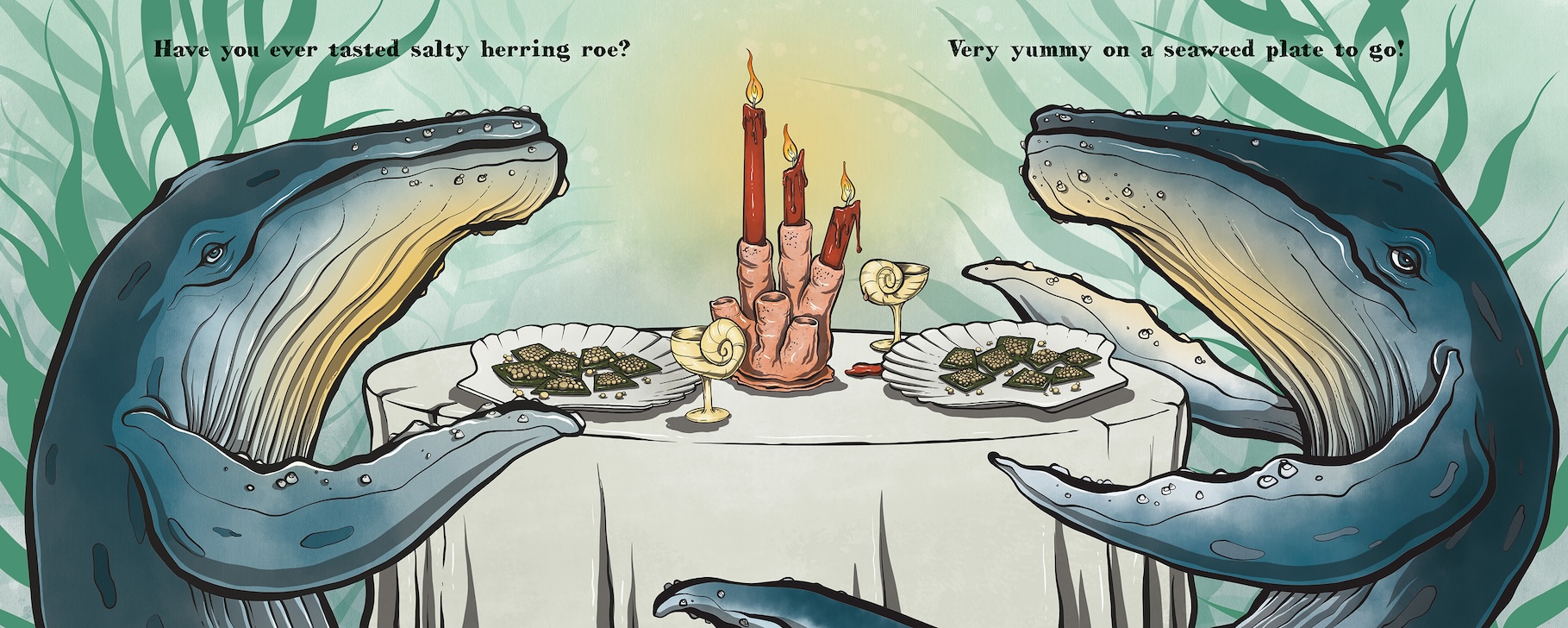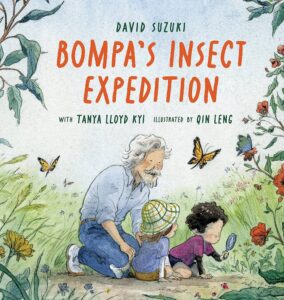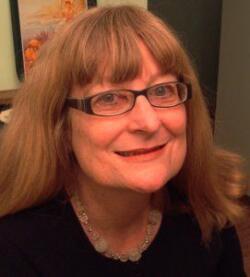Enviro-kids
Have You Ever Heard a Whale Exhale?
by Caroline Woodward (illustrated by Claire Victoria Watson)
Charlottetown: Pownall Street Press, 2024
$24.95 / 9781998129072
Bompa’s Insect Expedition
by David Suzuki with Tanya Lloyd Kyi (illustrated by Qin Leng)
Vancouver: Greystone Kids, 2023
$23.95 / 9781771648820
Reviewed by Ginny Ratsoy
*

From whales to fruit flies, the animal world provides fodder for BC writers to edify and entertain kids with environmentally conscious tales contained in eco-friendly packages.

In Have you Ever Heard a Whale Exhale? veteran writer Caroline Woodward puts her background as a lighthouse keeper to appropriate use by creating a multi-sensory marine experience. The book, designed to engender respect for the sea, serves as lyrical introduction to oceanic elements (primarily creatures) rather than being a single, connected narrative

Pre-schoolers, the primary audience, are likely to take to the text swimmingly. Written in the second person and comprised largely of a series of stimulating and often zany questions, Have you Ever Heard a Whale Exhale? is laced with healthy doses of alliteration, onomatopoeia, and rhymes–all good foundations for emergent literacy.
Like Woodward, Claire Victoria Watson knows that playfulness is more effective than preachiness in winning over a young audience. Watson cements her reputation as a visual chronicler of the British Columbia’s West Coast in visually arresting, light-hearted illustrations that neatly complement and augment the text.
The kinaesthetic image of humans entangled in a dance with an octopus is particularly memorable. An innovation that impressed this reader is the dust jacket’s inside: an azure poster easily tacked on to a bulletin board, is in keeping with the book’s environmentally-friendly message.


Bompa’s Insect Expedition, a product of the Suzuki Institute and written by the ubiquitous environmentalist (with input from UBC Creative Writing faculty member Tanya Lloyd Kyi) eschews a dust jacket to “reduce environmental impact.” Likely to appeal to children ages four to eight, the narrative is more overtly instructive in its environmental message than Have you Ever Heard a Whale Exhale?

Bompa (grandfather), who bears a striking resemblance to David Suzuki himself, leads twins Nakina and Kaoru (backpack and field journal in tow) on a nature expedition–in their own backyard.
Suzuki, whose early research was on fruit flies, uses insects such as bees, dragonflies, caterpillars, ants, mosquitoes, and butterflies as exemplars of the amazing and fragile ecosystem.
The twins are mesmerized at the intricacies in insects’ flight, and (relative to their size) the weights they can carry and the quantities they can eat. From their lesson, the twins deduce that, while the rest of the ecosystem could carry on without humans, humans–and other animals and plants–depend on these tiny creatures for their very existence.

Humans are dependant not only on the ecosystem, but also each other, Bompa points out–to wit, Bompa needs his grandchildren. The adventure ends with the three humans reflecting on their lesson on a picnic, surrounded by the tiny creatures whom Nakina and Kaoru see in a new light.

Young readers are overtly encouraged to emulate the expedition in appended matter that illustrates typical expedition equipment and provides information on more insects, as well as giving simple suggestions for how they can become “insect heroes” by creating the right environment for insect sustainability.
Visual development artist Qin Leng interprets the microcosmic expedition in detailed, whimsical illustrations.
I suspect those works that show the twins imagining eating 200 times their weight (like the caterpillar) and flying effortlessly in the sky (like the dragonfly) will captivate young readers.
Balancing the instructive and the engaging can be delicate; the creators of these works succeed because they are aware that science and imagination can go hand in hand.
*

Ginny Ratsoy is Professor Emerita at Thompson Rivers University. Her scholarly publications (co-authored and edited and co-edited books and numerous peer-reviewed articles) have focused on Canadian fiction, theatre, small cities, third-age learning, and the scholarship of teaching and learning. Recently, Ratsoy was honored and humbled to receive the 2024 Margaret Cleaveley Award for Canadian Literature Instruction from the Kamloops Adult Learners Society (KALS), where she has been a volunteer instructor since 2007 and, since her retirement in 2020, has also been involved as a board member and course coordinator. In both educational settings, she has enjoyed teaching environmental fiction. [Editor’s note: Ginny Ratsoy has reviewed books by Iona Whishaw, Danny Ramadan, Polly Horvath, Yolanda Ridge, Winona Kent, Amanda Lewis, Gregor Craigie, Iona Whishaw, Elizabeth Bass, Karen L. Abrahamson, & J.E. Barnard (eds.), and Gregor Craigie & Kathleen Fu for BCR.]
*
The British Columbia Review
Interim Editors, 2023-25: Trevor Marc Hughes (non-fiction), Brett Josef Grubisic (fiction)
Publisher: Richard Mackie
Formerly The Ormsby Review, The British Columbia Review is an online book review and journal service for BC writers and readers. The Advisory Board now consists of Jean Barman, Wade Davis, Robin Fisher, Barry Gough, Hugh Johnston, Kathy Mezei, Patricia Roy, Maria Tippett, and Graeme Wynn. Provincial Government Patron (since September 2018): Creative BC. Honorary Patron: Yosef Wosk. Scholarly Patron: SFU Graduate Liberal Studies. The British Columbia Review was founded in 2016 by Richard Mackie and Alan Twigg.
“Only connect.” – E.M. Forster
One comment on “Enviro-kids”